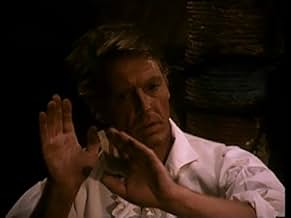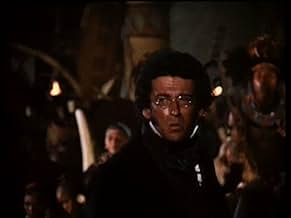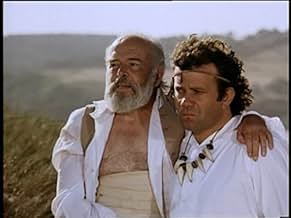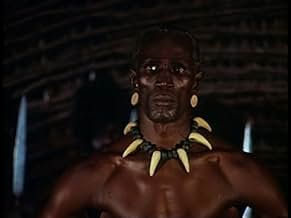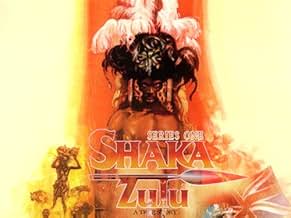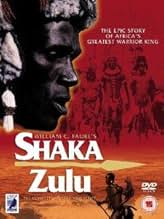IMDb RATING
7.7/10
3.5K
YOUR RATING
A historical account on the life of the Zulu King Shaka.A historical account on the life of the Zulu King Shaka.A historical account on the life of the Zulu King Shaka.
Browse episodes
Featured reviews
The Story is told based in the writings of Edward Fox's character, an adventurer named Francis George Farewell. Therefore, the more savage side of his nature is undubitably exaggerated.
To the best of our knowledge the salient points are correct, even to Henry Cele sharing the same basic build as Shaka, both of them quite imposing. There is some European romanticism tossed in, but it should be must viewing for anyone who loves history. Pooh-poohed by some critics as preposterous (as was Ghost in the Darkness, also an essentially true story), it is no more amazing than Napoleon's rise from obscurity to absolute power. They parallel in so many ways, in fact, that Shaka is oft called the "Napoleon of Africa". Though many Zulus consider Napoleon the "Shaka of Europe"
The production was fraught with controversy (it was filmed in South Africa before sanctions were lifted) but tries to convey a complex and fascinating story set in a tribal Africa steeped in mysticism with ideas about life and death that were very different from Europe. It manages to convey those ideas, and Shaka's formidible intellect, quite well. On top of that, it has as its star the perfect actor for the part.
Highly recommended and worth the time it takes to view it.
To the best of our knowledge the salient points are correct, even to Henry Cele sharing the same basic build as Shaka, both of them quite imposing. There is some European romanticism tossed in, but it should be must viewing for anyone who loves history. Pooh-poohed by some critics as preposterous (as was Ghost in the Darkness, also an essentially true story), it is no more amazing than Napoleon's rise from obscurity to absolute power. They parallel in so many ways, in fact, that Shaka is oft called the "Napoleon of Africa". Though many Zulus consider Napoleon the "Shaka of Europe"
The production was fraught with controversy (it was filmed in South Africa before sanctions were lifted) but tries to convey a complex and fascinating story set in a tribal Africa steeped in mysticism with ideas about life and death that were very different from Europe. It manages to convey those ideas, and Shaka's formidible intellect, quite well. On top of that, it has as its star the perfect actor for the part.
Highly recommended and worth the time it takes to view it.
I must say I was sorry when I got to the 10th and last episode of "Shaka Zulu". I totally agree with the review by njmollo, very good. The acting of Shaka by Henry Cele is really what made the movie as good as it was and I could not think of anyone else acting as Shaka after having seen Henry Cele as Shaka, it has to be the top casting and acting ever. I find it incredible disappointing that when I look up Shaka Zulu the first actors mentioned are the white English actors, not Henry Cele??? Not saying that the acting by the English was not good but certainly not superior to all the black actors who were very good, such a pleasure to watch as was the portrayal of the Zulu culture and lifestyle. Loved it.
i must say i have been having quite a laugh at the ridiculous statements made about this. 1: it was not a propaganda film made by the white government to woo the Zulus, utter trash! the white government wanted nothing to do with it, especially as it was being made by a white south African, it was only made because harmony gold the American TV company got involved. 2: it was not taken from the writings of Francis farewell it was based on henry Finns diary (played by Robert Powell). 3: the savagery certainly was not exaggerated thats me off my soap box. the film is quite brilliant, although not historically correct in many places as Joshua Sinclare has used a lot of poetic licence to make a more interesting story, not that the real story is uninteresting, for television. highly entertaining with very real portrayals of traditional Zulu life, i know i lived with them i am south African. but my saying has always been don't listen to others watch it and make up your own mind, i just don't like people who are ignorant and make comments with out knowing what they are talking about.
It seems that the best actors were the tribesmen, done on location, and very graphic on the gore. Could tell right away that this wasn't American Television. The Aussie's and New Zelanders, definately make better mini-series than we do.
Thinking of South-Africa and the 1980s in one context, three things come to mind: apartheid, boycott and the mini-series "Shaka Zulu". I'd place this among the best mini-series of the 80's and 90's, among shows like "Shogun", "Tai-Pan", "Roots" and "North and South". "Shaka Zulu" has bit from all of them. It's got history; it's got adventure and action, it has compelling characters and story lines that keep you glued to the screen.
Shaka has most often been described as the Napoleon of Africa", which isn't incorrect, yet, I myself do like to see him as the King Arthur of South Africa. This is mainly due to having read Thomas Mofolos "Chaka Zulu" prior to having seen the TV-series. If you're the reading type, I recommend you to pick it up; it's not only a masterpiece of storytelling, but combines history and mysticism perfectly. Some of the mystic elements have made it into the series (the prophecy of Shaka's rise to power; the forging of Shaka's spear), but generally the story of the TV-show is rooted in reality.
What's to be said about the actors? Well, people like Edward Fox, Robert Powell or Fiona Fullerton are beyond dispute, doing a fine job as would be expected. Same goes by short but poignant guest-appearances by the likes of Sir Christopher Lee, Trevor Howard and Roy Dotrice (superb as a decadent King George IV) but the real kudos must go to the South African cast which, despite being mainly laymen actors, come across as convincingly and authentic as they come.
Former South-African football hero Henry Cele embodies Shaka Zulu like Helmut Berger embodied King Ludwig II of Bavaria, imposing and final. Dudu Mkize virtually steals the scenes she's in, with a mix of grace and dignity that is rare to see on modern TV or Conrad Magwaza as Shakas father Senzagakona and Gugu Nxumalo as Shakas feline-like aunt Mkabayi. Sadly, most of those actors were never seen on screen again; Cele starring in a couple of low-budget action / horror flicks (among them "The Ghost and the Darkness), same goes for Mkizi and for Magwaza (apart in a guest-appearance in a film about Albert Schweizer) and Nxumala, "Shaka Zulu" that remained their only appearance on the silver screen.
In essence, this is a (mini)-series that makes you feel sad once you've reached the final episode: sad that it's over and that there is no more. One wishes it would have gone on, that one could have seen more of the characters, their stories, and more of the rich Zulu culture and its history.
I'd give it 10/10 points if it wasn't for the abrupt, sudden ending, which comes as a bit of a let-down, so 9 from 10 will have to do.
Shaka has most often been described as the Napoleon of Africa", which isn't incorrect, yet, I myself do like to see him as the King Arthur of South Africa. This is mainly due to having read Thomas Mofolos "Chaka Zulu" prior to having seen the TV-series. If you're the reading type, I recommend you to pick it up; it's not only a masterpiece of storytelling, but combines history and mysticism perfectly. Some of the mystic elements have made it into the series (the prophecy of Shaka's rise to power; the forging of Shaka's spear), but generally the story of the TV-show is rooted in reality.
What's to be said about the actors? Well, people like Edward Fox, Robert Powell or Fiona Fullerton are beyond dispute, doing a fine job as would be expected. Same goes by short but poignant guest-appearances by the likes of Sir Christopher Lee, Trevor Howard and Roy Dotrice (superb as a decadent King George IV) but the real kudos must go to the South African cast which, despite being mainly laymen actors, come across as convincingly and authentic as they come.
Former South-African football hero Henry Cele embodies Shaka Zulu like Helmut Berger embodied King Ludwig II of Bavaria, imposing and final. Dudu Mkize virtually steals the scenes she's in, with a mix of grace and dignity that is rare to see on modern TV or Conrad Magwaza as Shakas father Senzagakona and Gugu Nxumalo as Shakas feline-like aunt Mkabayi. Sadly, most of those actors were never seen on screen again; Cele starring in a couple of low-budget action / horror flicks (among them "The Ghost and the Darkness), same goes for Mkizi and for Magwaza (apart in a guest-appearance in a film about Albert Schweizer) and Nxumala, "Shaka Zulu" that remained their only appearance on the silver screen.
In essence, this is a (mini)-series that makes you feel sad once you've reached the final episode: sad that it's over and that there is no more. One wishes it would have gone on, that one could have seen more of the characters, their stories, and more of the rich Zulu culture and its history.
I'd give it 10/10 points if it wasn't for the abrupt, sudden ending, which comes as a bit of a let-down, so 9 from 10 will have to do.
Did you know
- TriviaThis has been the most frequently broadcast TV mini-series in the U.S. By 1992, over 350 million viewers had seen it. This mini-series dislodged The Hunters (1957) and The Gods Must Be Crazy (1980) and its sequels as the prime shaper of American perceptions of "tribal" history in southern Africa. The series even achieved cult status. The U.K. actors and actresses who worked on the project were nearly blacklisted by the U.N.
- Alternate versionsAlso released on video in an edited, 'feature length' version.
- ConnectionsFollowed by Shaka Zulu: The Citadel (2001)
- SoundtracksWe Are Growing
By Patric van Blerk, Julian Laxton, Margaret Singana and David Pollecutt (as Dave Pollecutt)
Sung by Margaret Singana and the Baragwanath Choir
- How many seasons does Shaka Zulu have?Powered by Alexa
Details
Contribute to this page
Suggest an edit or add missing content







